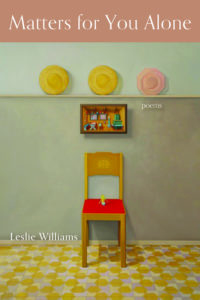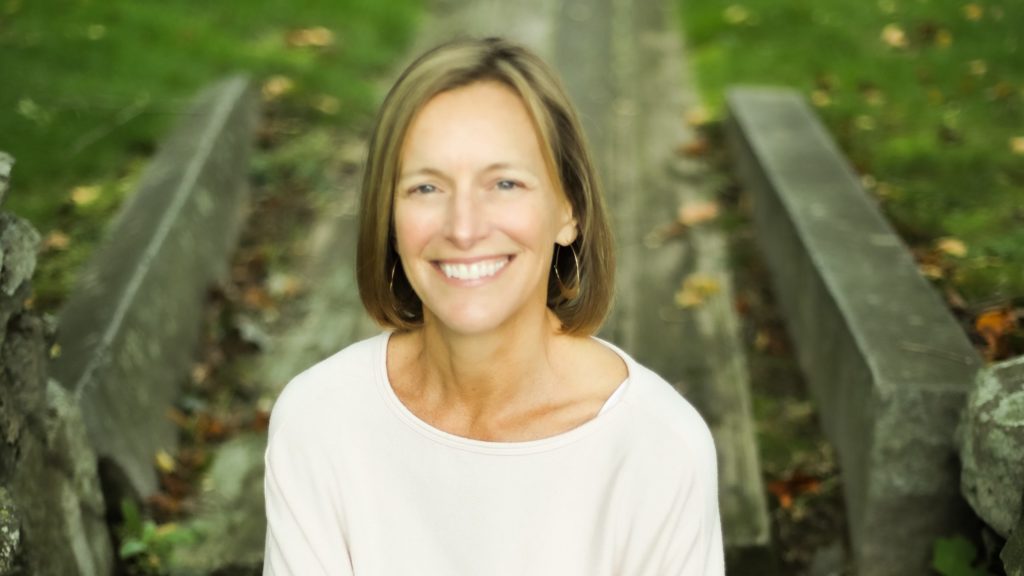Leslie Williams is an award-winning Massachusetts poet whose collections include “Success of the Seed Plants” (Bellday Books Inc., $14) and “Even the Dark” (Southern Illinois University Press, $18).
Her latest, “Matters For You Alone” (Slant Books, $17), consists in “a spiritual exploration of friendship: its shapes and duties, stresses and blames — and its absolute necessity.”
The title derives from the Jean-Pierre de Caussade 18th-century classic “Abandonment to Divine Providence,” and the poems are shot through with the search and longing for God, for connection, for the desire to love and to be loved.
Allusions to the Gospels and Psalms are threaded through the poems. Would it be fair to say that your work is grounded in prayer?
Absolutely. I usually start the day with coffee and Scripture and pray forward into writing. Often the imagery is so evocative that I want to sit with it more. I hope the poems are attuned to — and enmeshed with — deep images of the Bible. The beauty, terror, all the human failings, and the mercy. Plus, angels, demons, grasshoppers, almonds, vineyards, and precious perfume! In prayer, like in poems, I’d ask for the channel to be opened, and then to receive gratefully whatever the Lord provides.

Landscape and New England weather also play a big part in your poems. You obviously love where you live; at the same time a note of melancholy seeps through. I’m reminded that we’re called to friendship not only with other people but with time and place, with our mistakes and regrets, our limitations, our very real failures of love.
This is so beautiful. Ah, to make friends with our own regrets, which in a way is to see ourselves as God sees us. I hope the theme will radiate outward in the ways you describe. I also rely on a kind of friendship with the reader, as she brings her own experience to the book. It’s a kind of alchemy reader and writer create together that can be very personal. I feel a kinship with writers I love and want to spend time with.
You sketch the outlines of so many different kinds, and facets, of friendship: the friend lost to chaotic living, the friend who’s dying, the friend from whom we’re distanced by the very fact of our faith.
Yes, and how friends hold up a mirror for us, while teaching us how to love, what to do, and try not to do! Your last example is tough. I think of Jesus saying, “Who are my mother and my brothers?” And yet it’s painful, when you know a friend is disparaging you for “really believing that Jesus stuff.”
We’ve all had the friend who has very little capacity to reciprocate. We’re tempted to drop him or her.
Another thing that fascinates me about friendship is how stretchy it is. In times when I had very little to give, friends stuck by. At other points I’ve been the one who worked to keep the friendship alive.
But the friend, it seems to me, invites us to look at ourselves, to recognize that the way we view ourselves (not to mention the other person) may not be all that accurate. I’m often not especially able to listen to Christ, either. I’m always wanting to lay my problems on him, but do I ask about his?
I’m thinking about Sadao Watanabe’s beautiful stencil print, “Last Supper,” in which the beloved disciple seated at table just leans his head on the Lord’s shoulder. What a friend we have in Jesus, as the old hymn goes. But if I attempt for a moment to ponder Jesus’ heart it becomes too much for me, all the sorrow it holds, and every bit of brokenness he longs to redeem. What he says in John 15 is resonant, and difficult: “Greater love has no one than this: to lay down one’s life for one’s friends” (NIV).
It’s a big question, but what has friendship taught you?
I read somewhere that we can expect our “friend landscape” to look pretty different every seven years or so, as interests, jobs, locations, and stages of life change. This is both exciting and daunting, and makes long-term friendships ever more meaningful for their endurance alone, and for the shared history they preserve.
Through friends I’ve been shown how much I need others, even though I pride myself on being self-sufficient. As an introvert, reader, solitary garden wanderer, I can sometimes think a contemplative practice is sustenance enough. But friendship is essential for the journey and gives us a foretaste of Glory. I recently did a certificate program in Spiritual Direction and our cohort developed deep bonds. I bet if we started talking politics or hyper-local church stuff, we’d find many ways to disagree. But we began as friends in Christ, so that grounding (for me) transcends differences because it first presumes Love.
I’ve also become much more familiar with the log in my own eye as compared to the speck in my friends’. I hope they will forgive my failures to love well. In “The Speck,” a poem from the book, the speaker acknowledges the truth about a wayward friend: “How she really tried. How she cannot help it.” And the St. Francis prayer is a lovely guide: “O divine Master, grant that I may not so much seek to be consoled as to console, to be understood as to understand, to be loved as to love.”

